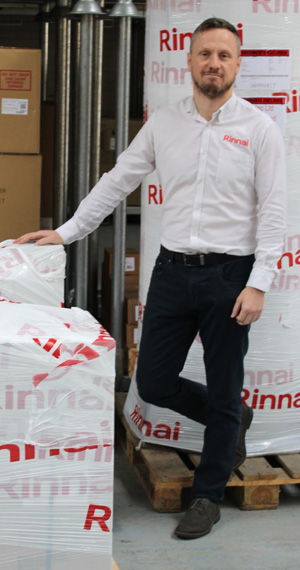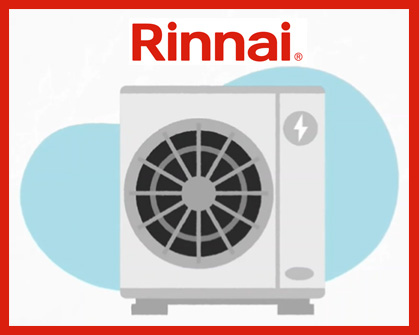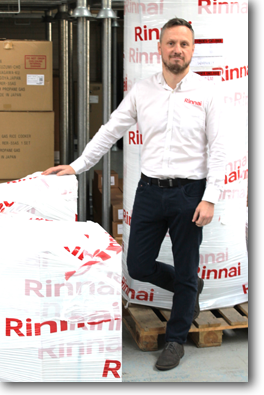Tony Gittings, Rinnai Managing Director
Can our electricity grids handle the heat – and can governments need to accommodate growing demand without infringing upon NetZero ambitions? Rinnai Managing Director Tony Gittings looks at the accelerated increases in demand for cooling technology due to global warming.
A requirement for properties to be cooled during summer months is becoming ever more sought after by both international and UK customers. Global temperatures have proven to be rising, largely due to human activity. Records have confirmed that 2024 was officially the warmest year on record and the first calendar year that the average global temperature exceeded 1.5°C above pre-industrial level.
In recent times the UK has also recorded the highest ever temperature, 40.3C on 19th July 2022 in Lincolnshire. Official Met Office data has confirmed that 2025 was the hottest summer since records began in 1884. From the 1st of June (2025) to 31st August, the average temperature was 16.10°C, 1.51°C above the long-term meteorological mean temperature. The previous record was set in 2018 and was recorded at 15.76°C.
Incidentally, all five of the hottest average temperatures recorded in the UK were in between 2002 and 2025. These officially recorded figures can be viewed as being indicative of a trend that demonstrates the local UK climate of increasing heat.
This official data highlights why air conditioning and cooling is fast becoming a burgeoning problem for the property stock during the UK summer period. It is estimated that 3% of UK homes currently have air conditioning, whilst some researchers have projected that as many as 79% of UK domiciles will contain cooling devices by 2085.
In well populated predominant countries such as China and the USA air conditioning is far more prevalent. Over in the USA around 90% of homes have air conditioning according to a 2020 federal-government survey. The number of homes in China that utilise air conditioning is around 60%. In Hong Kong 99% of dwellings possess AC units.
In the European block – where demand for building cooling has been historically lower when compared to the more humid and hotter climates of America and China, around 20% of private dwellings own air conditioning facilities. Of this percentage France accounts for 25% and in Germany only around 3% of homes are in ownership of cooling technology.
HVAC systems in all the aforementioned countries will experience an increase in demand not only in private accommodation but also in public and commercial premises. A major future issue is now expected regarding the expansion of cooling AC systems: how will the increase of electricity production, distribution and usage affect NetZero ambitions across the globe? And how will international governments ensure the farming of reliable and responsible sources of power that will fuel additional pressure on separate national grids.
The UK government is in the process of drafting a “Cooling Outlook” document – which aims to present a series of measures that identify policy, data and practises which guarantee air conditioning is aligned with global cooling pledge commitments.
The Global Cooling Pledge (GCP) was established during COP28 by the United Arab Emirates. The GCP consists of a coalition of voluntary countries, cities and non-state organisations that are committed to reducing cooling-related emissions by 68% before 2050.
Further aims held by GCP members include increasing access to sustainable and responsible cooling by 2030 as well as improving the efficiency of new air conditioning units by 50%, also by 2030. The GCP further aims to absorb cooling into national and global climate goals and set forward ratified building standards that utilise strict and sustainable material procurement practises.
A key element of the GCP will be widespread international cooperation that will share gaps in policy, data and technological improvements. Countries that have signed up for the Global Cooling Pledge include: the US, Canada, UK, Germany, France, Spain and the Netherlands.
In relation to domestic UK framework, the precise purpose of the “Cooling Outlook” document will be to offer a single authorised paper of all aspects concerned with UK cooling; issues that will be explored and improved upon consist of policy refinement, cooling related data accumulation and sharing, government interdepartmental collaboration in creating a shared understanding of domestic cooling approach and promoting the adoption of sustainable cooling technology.
A majority of air conditioning units are powered by electricity and renewable sources of fuel such as wind or solar. European gross electricity consumption in the year 2023 shows that 45.3% was derived from renewable sources. UK figures from between January 2024-2025 demonstrate that 42.3% of all generated electricity was cultivated via clean renewable resources.
Clean Chinese electrical generation is advancing far beyond any other nation with rapid construction of multiple renewable installations. It was reported in June 2025, that China had installed 93GW of solar capacity in May 2025 “100 solar panels every second.” Between January and May 2025, China had included 198GW of solar and 46GW of wind capacity into domestic operations, producing as much electricity as Turkey or Indonesia.
American electricity is dominated by natural gas where 43.1% of electrical output is produced via fossil fuels. But the second highest contributor to national electricity supplies is met by renewables who account for 21.4%.
As more utility scale renewable projects are added to European, UK, Chinese and American power grids, larger volumes of clean electricity can be accessed by air cooling technologies, meaning that AC units can be considered a clean utility.
Due to rising global and domestic UK temperatures the use of cooling technologies is projected to rise across all countries. As to limit any additional emissions that could be added to international and national carbon loads, preparations and measures that specifically focus on air conditioning must be implemented towards official environmental targets.
The Global Cooling Pledge (GCP) and the UK “Cooling Outlook” document are evidence that an increase in cooling systems used by buildings in summer are under serious observation.
Rinnai constantly monitors any movement in policy that affects commercial and residential heating, air conditioning and hot water options. Contractors, specifiers, system designers and consultants will be kept informed and updated on any news items that supply insight into potential adaptations of UK governmental and global energy direction.
RINNAI OFFERS CLEAR PATHWAYS TO LOWER CARBON AND DECARBONISATION
PLUS CUSTOMER COST REDUCTIONS FOR COMMERCIAL, DOMESTIC
AND OFF-GRID HEATING & HOT WATER DELIVERY
click here to learn more about Rinnai
- Rinnai’s range of decarbonising products – H1/H2/H3 – consists of hot water heating units in gas/BioLPG/DME, hydrogen ready units, electric instantaneous hot water heaters, electric storage cylinders and buffer vessels, a comprehensive range of heat pumps, solar, hydrogen-ready or natural gas in any configuration of hybrid formats for either residential or commercial applications. Rinnai’s H1/2/3 range of products and systems offer contractors, consultants, and end users a range of efficient, robust, and affordable low carbon/decarbonising appliances which create practical, economic, and technically feasible solutions.
- Rinnai is a world leading manufacturer of hot water heaters and produces over two million units a year, operating on each of the five continents. The brand has gained an established reputation for producing products that offer high performance, cost efficiency and extended working lives.
- Rinnai products are UKCA certified, A-rated water efficiency, accessed through multiple fuel options and are available for purchase 24/7, 365 days a year. Any unit can be delivered to any UK site within 24 hours.
- Rinnai offer carbon and cost comparison services that will calculate financial, and carbon savings made when investing in a Rinnai system. Rinnai also provide a system design service that will suggest an appropriate system for the property in question.
- Rinnai offer comprehensive training courses and technical support in all aspects of the water heating industry including detailed CPD’s.
- The Rinnai range covers all forms of fuels and appliances currently available – electric, gas, hydrogen, BioLPG, DME solar thermal, low GWP heat pumps and electric water heaters More information can be found on Rinnai’s website and its “Help Me Choose” webpage.
CLICK HERE TO VISIT THE RINNAI WEBSITE
or HERE to EMAIL RINNAI
CLICK HERE For more information on the RINNAI product range

















